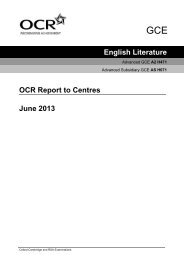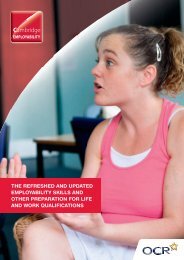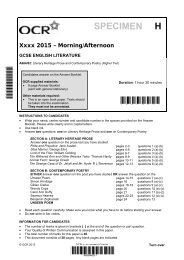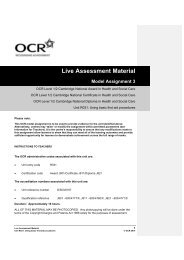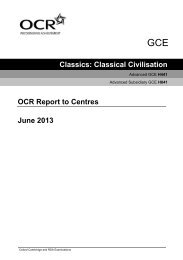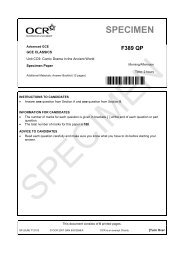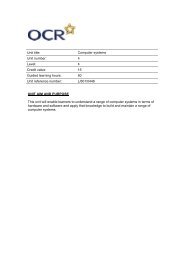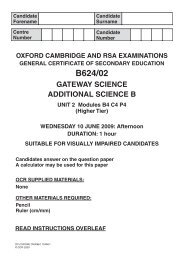Level 3 - Unit 10 - Outdoor and adventurous activities - OCR
Level 3 - Unit 10 - Outdoor and adventurous activities - OCR
Level 3 - Unit 10 - Outdoor and adventurous activities - OCR
You also want an ePaper? Increase the reach of your titles
YUMPU automatically turns print PDFs into web optimized ePapers that Google loves.
Cambridge<br />
TECHNICALS<br />
<strong>OCR</strong> LEVEL 3<br />
CAMBRIDGE TECHNICAL<br />
CERTIFICATE/DIPLOMA IN<br />
SPORT<br />
OUTDOOR AND ADVENTUROUS<br />
ACTIVITIES<br />
K/502/5638<br />
LEVEL 3 UNIT <strong>10</strong><br />
GUIDED LEARNING HOURS: 60<br />
UNIT CREDIT VALUE: <strong>10</strong>
<strong>Outdoor</strong> <strong>and</strong> Adventurous Activities <strong>Level</strong> 3 <strong>Unit</strong> <strong>10</strong><br />
OUTDOOR AND ADVENTUROUS<br />
ACTIVITIES<br />
K/502/5638<br />
LEVEL 3<br />
ASSESSMENT AND GRADING CRITERIA<br />
AIM OF THE UNIT<br />
Sport doesn’t end in a gym or on a field; there is a huge<br />
range of <strong>activities</strong> that can take place anywhere such as<br />
halfway up a mountain, on a ferocious river, under the sea or<br />
even in the clouds. Obviously with such <strong>activities</strong> there is a<br />
lot of emphasis on safety <strong>and</strong> environmental considerations<br />
to be taken so you will need to know about the organisations<br />
that regulate the <strong>activities</strong> <strong>and</strong> the rules <strong>and</strong> guidelines that<br />
they put in place in order to participate safely while still<br />
having fun.<br />
By completing this unit learners will develop knowledge,<br />
underst<strong>and</strong>ing <strong>and</strong> practical skills associated with<br />
outdoor <strong>and</strong> <strong>adventurous</strong> <strong>activities</strong>. They will develop an<br />
underst<strong>and</strong>ing of the scope of outdoor <strong>and</strong> <strong>adventurous</strong><br />
activity provision <strong>and</strong> the effect these <strong>activities</strong> have on<br />
the environment. They will also be able to review their<br />
performance in an activity <strong>and</strong> look at ways of developing<br />
<strong>and</strong> improving.<br />
PURPOSE OF THE UNIT<br />
This will help the learner gain an underst<strong>and</strong>ing of the range<br />
of outdoor <strong>and</strong> <strong>adventurous</strong> <strong>activities</strong> that are on offer. The<br />
learner will also find out who is responsible for regulating<br />
the <strong>activities</strong> <strong>and</strong> which organisations provide both facilities<br />
<strong>and</strong> instruction for the various <strong>activities</strong>. Health <strong>and</strong> safety<br />
are important aspects of delivering sport <strong>and</strong> in particular<br />
in delivering <strong>and</strong> participating in outdoor <strong>and</strong> <strong>adventurous</strong><br />
<strong>activities</strong> as if these are not adhered to the consequences<br />
can be fatal. The way that the environment is looked after is<br />
important in today’s society. Learners will look at the impact<br />
<strong>activities</strong> can have on the environment <strong>and</strong> learn about how<br />
the <strong>activities</strong> are organised in order to keep the impact to<br />
a minimum. Learners will participate in a range of outdoor<br />
<strong>and</strong> <strong>adventurous</strong> <strong>activities</strong>. This can be a new <strong>and</strong> exciting<br />
experience for many learners <strong>and</strong> will often offer them the<br />
opportunity to experience life changing challenges. Often<br />
outdoor <strong>and</strong> <strong>adventurous</strong> <strong>activities</strong> enable learners to work<br />
as a member of a team, this reflects the nature of the sports<br />
industry where this is a skill which is greatly in dem<strong>and</strong>.<br />
Learning Outcome (LO) Pass Merit Distinction<br />
The assessment criteria are To achieve a merit the To achieve a distinction<br />
the pass requirements for evidence must show that, the evidence must show<br />
this unit. in addition to the pass that, in addition to the pass<br />
criteria, the learner is able to: <strong>and</strong> merit criteria, the<br />
The learner will: The learner can: learner is able to:<br />
1 Know about the<br />
organisation <strong>and</strong><br />
provision of outdoor <strong>and</strong><br />
<strong>adventurous</strong> <strong>activities</strong><br />
2 Know the safety<br />
<strong>and</strong> environmental<br />
considerations associated<br />
with outdoor <strong>and</strong><br />
<strong>adventurous</strong> <strong>activities</strong><br />
3 Be able to participate in<br />
outdoor <strong>and</strong> <strong>adventurous</strong><br />
<strong>activities</strong><br />
P1 describe four different<br />
outdoor <strong>and</strong> <strong>adventurous</strong><br />
<strong>activities</strong>, including their<br />
organisation <strong>and</strong> provision<br />
P2 describe safety<br />
considerations associated<br />
with four different<br />
outdoor <strong>and</strong> <strong>adventurous</strong><br />
<strong>activities</strong><br />
P3 describe environmental<br />
considerations associated<br />
with four different<br />
outdoor <strong>and</strong> <strong>adventurous</strong><br />
<strong>activities</strong><br />
P4 demonstrate appropriate<br />
skills <strong>and</strong> techniques in<br />
two different outdoor <strong>and</strong><br />
<strong>adventurous</strong> <strong>activities</strong>,<br />
with tutor support<br />
M1 justify safety<br />
considerations associated<br />
with outdoor <strong>and</strong><br />
<strong>adventurous</strong> <strong>activities</strong><br />
M2 justify environmental<br />
considerations associated<br />
with outdoor <strong>and</strong><br />
<strong>adventurous</strong> <strong>activities</strong><br />
M3 demonstrate awareness<br />
of health <strong>and</strong> safety<br />
procedures when<br />
participating in outdoor<br />
<strong>and</strong> <strong>adventurous</strong> <strong>activities</strong><br />
D1 lead an outdoor <strong>and</strong><br />
<strong>adventurous</strong> activity, with<br />
tutor support<br />
4 Be able to review own<br />
performance in outdoor<br />
<strong>and</strong> <strong>adventurous</strong> <strong>activities</strong><br />
P5 carry out a review of own<br />
performance in outdoor<br />
<strong>and</strong> <strong>adventurous</strong> <strong>activities</strong>,<br />
identifying strengths <strong>and</strong><br />
areas for improvement<br />
M4 carry out a review<br />
of health <strong>and</strong> safety<br />
procedures for outdoor<br />
<strong>and</strong> <strong>adventurous</strong> <strong>activities</strong><br />
D2 carry out a review of<br />
leadership in outdoor <strong>and</strong><br />
<strong>adventurous</strong> <strong>activities</strong><br />
P6 design a development<br />
plan for improving own<br />
performance in outdoor<br />
<strong>and</strong> <strong>adventurous</strong> <strong>activities</strong><br />
www.ocr.org.uk 2<br />
3
<strong>Outdoor</strong> <strong>and</strong> Adventurous Activities <strong>Level</strong> 3 <strong>Unit</strong> <strong>10</strong><br />
TEACHING CONTENT<br />
The unit content describes what has to be taught to ensure that learners are able to access the highest grade.<br />
Anything which follows an i.e. details what must be taught as part of that area of content.<br />
Anything which follows an e.g. is illustrative, it should be noted that where e.g. is used, learners must know <strong>and</strong> be able to apply<br />
relevant examples to their work though these do not need to be the same ones specified in the unit content.<br />
LO1 Know about the organisation <strong>and</strong> provision<br />
of outdoor <strong>and</strong> <strong>adventurous</strong> <strong>activities</strong><br />
<strong>Outdoor</strong> <strong>and</strong> <strong>adventurous</strong> <strong>activities</strong>: (e.g. l<strong>and</strong>-based (e.g.<br />
mountain walking, camping, mountain biking, rock climbing,<br />
abseiling, orienteering, high rope courses, caving, mining,<br />
skiing, snowboarding) water-based (e.g. canoeing, kayaking,<br />
sailing, windsurfing, water skiing, surfing) air-based (e.g. gliding,<br />
parachuting, paragliding, parascending) urban locations (e.g.<br />
indoor climbing walls, artificial ski slopes)).<br />
Organisation: (e.g. National Governing Bodies (e.g. British<br />
Mountaineering Council (BMC), British Orienteering Federation<br />
(BOF), British Caving Association (BCA), British Canoe Union<br />
(BCU), Royal Yachting Association (RYA), British Surfing<br />
Association (BSA), British Gliding Association (BGA)) voluntary<br />
bodies (e.g. the ramblers association, local clubs affiliated to the<br />
BMC/BCU, National Parks)).<br />
Provision: (e.g. National sports centres (e.g. Plas-y-Brenin, Holme<br />
Pierrepont, Plas Menai) other providers (e.g. local education<br />
authority centres, outdoor education centres, residential camps,<br />
activity holiday organizations, Outward Bound centres, Scouts,<br />
Guides, YHA centres)).<br />
LO2 Know the safety <strong>and</strong> environmental<br />
considerations associated with outdoor <strong>and</strong><br />
<strong>adventurous</strong> <strong>activities</strong><br />
Safety considerations: i.e. Health <strong>and</strong> safety (e.g. risk assessments;<br />
emergency procedures, contingency plans, personal, clothing<br />
<strong>and</strong> equipment) general safety considerations (e.g. location,<br />
supplies, shelter, weather, timing).<br />
Environmental considerations: i.e. access <strong>and</strong> egress (e.g.<br />
permitted access to a river when canoeing) flora, fauna, wildlife<br />
(e.g. when rock climbing respect the flora, fauna on the crag<br />
<strong>and</strong> when accessing the crag) national parks, guidelines <strong>and</strong><br />
legislation (countryside code, Countryside Rights of Way Act<br />
2000 – CRoW).<br />
LO3 Be able to participate in outdoor <strong>and</strong><br />
<strong>adventurous</strong> <strong>activities</strong><br />
Skills <strong>and</strong> techniques: (e.g. l<strong>and</strong>-based <strong>activities</strong> (e.g. mountain<br />
walking: navigation, route planning; rock climbing: knots,<br />
belaying, abseiling, route finding), water-based <strong>activities</strong><br />
(e.g. kayaking: strokes, capsize drills; windsurfing: strokes,<br />
manoeuvring) air-based <strong>activities</strong> (take-off, l<strong>and</strong>ing, effective<br />
h<strong>and</strong>ling of controls, navigation)).<br />
Use of equipment (e.g. rock climbing: ropes, harness, belaying<br />
devices, helmet, canoeing: wet suit, buoyancy aid, paddle,<br />
canoe).<br />
Adherence to health <strong>and</strong> safety (see LO2)<br />
LO4 Be able to review own performance in<br />
outdoor <strong>and</strong> <strong>adventurous</strong> <strong>activities</strong><br />
Assess: i.e. ability to demonstrate appropriate skills (e.g. rock<br />
climbing – use of appropriate equipment, ability to route find,<br />
decision making during performance) <strong>and</strong> health <strong>and</strong> safety<br />
(e.g. rock climbing – ability to put harness on correctly, ability<br />
to tie appropriate knots) in outdoor <strong>and</strong> <strong>adventurous</strong> <strong>activities</strong><br />
participated in.<br />
Self-analysis: (e.g. identifying strengths <strong>and</strong> areas for<br />
improvement in outdoor <strong>and</strong> <strong>adventurous</strong> <strong>activities</strong><br />
participated in).<br />
Assessment methods: i.e. analysis of performance, observations,<br />
performance profiling , analysis of performance data, use of<br />
technology, testing, interviews.<br />
Development: (e.g. training courses, training programme, local<br />
opportunities (e.g. joining a local club, after school clubs) any<br />
barriers to development (e.g. lack of available local facilities).<br />
DELIVERY GUIDANCE<br />
LO1<br />
For this unit learners have to know about four different<br />
outdoor <strong>activities</strong>. The best way for them to be able to<br />
obtain the knowledge needed is to participate in the<br />
<strong>activities</strong>. Learners should know about the range of outdoor<br />
<strong>and</strong> <strong>adventurous</strong> <strong>activities</strong> that are available particularly in the<br />
<strong>Unit</strong>ed Kingdom. They need to ensure that they know about<br />
a range of <strong>activities</strong>, the most common being l<strong>and</strong> based <strong>and</strong><br />
water based.<br />
Learners need to know about the organisation <strong>and</strong> provision<br />
of outdoor <strong>and</strong> <strong>adventurous</strong> <strong>activities</strong>. They are asked to<br />
describe the <strong>activities</strong>. Tutors could find out what outdoor<br />
facilities <strong>and</strong> organisations operate locally <strong>and</strong> arrange for the<br />
learners to visit. Alternatively tutors could arrange for guest<br />
speakers to come in <strong>and</strong> talk to the learners. Organisations<br />
could be researched on the internet. Learners will need to<br />
liaise with tutors to determine which four <strong>activities</strong> they will<br />
research for this unit as it will depend on access to facilities.<br />
Providers of outdoor <strong>and</strong> <strong>adventurous</strong> <strong>activities</strong> could be<br />
described in terms of:<br />
• location<br />
• range of facilities<br />
• range of <strong>activities</strong><br />
• opening times<br />
• charges.<br />
LO2<br />
Learners need to know the safety <strong>and</strong> environmental<br />
considerations associated with outdoor <strong>and</strong> <strong>adventurous</strong><br />
<strong>activities</strong>. Learners should research the information needed<br />
for this AO in relation to the <strong>activities</strong> chosen in LO1. They<br />
should use the same <strong>activities</strong> as in LO1 wherever possible.<br />
The following is an outline of what they should learn about:<br />
- Health <strong>and</strong> safety (e.g. is the activity suitable for the<br />
group, have all potential risks been identified)<br />
- Emergency procedures (e.g. is there a first aider available,<br />
is there an escape route should you become trapped, will<br />
there be mobile phone reception to contact emergency<br />
services)<br />
- Contingency plans (e.g. alternative route should there be<br />
an unexpected obstruction, spare equipment should any<br />
break)<br />
- Personnel (e.g. is the activity leader suitably qualified)<br />
- Clothing <strong>and</strong> equipment (e.g. appropriate to the activity,<br />
not damaged/torn)<br />
- Location (e.g. is the terrain suitable for the activity, is it<br />
suitable for the experience of the participants)<br />
- Supplies (e.g. will there be access to food <strong>and</strong> water)<br />
- Shelter (e.g. will an overnight stay be required, is there<br />
shelter from adverse weather conditions)<br />
- Weather forecast (e.g. will the weather conditions be<br />
suitable for the activity, will the weather conditions cause<br />
any risk during the activity)<br />
- Timing (e.g. is the time length of the activity suitable)<br />
- Flora, fauna, wildlife (e.g. respect, preservation,<br />
conservation).<br />
LO3<br />
Learners need to participate in two outdoor <strong>and</strong> <strong>adventurous</strong><br />
<strong>activities</strong>. There is no reason why learners cannot participate<br />
in more than two <strong>activities</strong> <strong>and</strong> choose which two will<br />
give them the required assessment criteria. Learners will<br />
need to liaise with tutors to determine which <strong>activities</strong> they<br />
will participate in for this unit as it will depend on access<br />
to facilities. A residential could be undertaken if facilities<br />
locally are not adequate. Skills <strong>and</strong> techniques, the use of<br />
equipment <strong>and</strong> adherence to health <strong>and</strong> safety need to be<br />
detailed for each activity undertaken.<br />
Learners will only be able to access air based <strong>activities</strong> in<br />
particular areas of the UK <strong>and</strong> may not be able to participate<br />
due to financial constraints. Therefore it is suggested that,<br />
if possible, learners know about two l<strong>and</strong> based <strong>and</strong> two<br />
water based <strong>activities</strong>. Where this is not possible a range of<br />
<strong>activities</strong> within the category should be experienced (e.g.<br />
canoeing or kayaking <strong>and</strong> dinghy sailing). It is also possible<br />
for learners to use urban indoor facilities (rock climbing <strong>and</strong><br />
skiing) <strong>and</strong> urban outdoor facilities (manmade canoe slalom<br />
courses).<br />
LO4<br />
Learners need to be able to review own performance in<br />
outdoor <strong>and</strong> <strong>adventurous</strong> <strong>activities</strong>. This is dependent upon<br />
the <strong>activities</strong> they have chosen. The review of performance<br />
could include:<br />
• nature of activity/techniques learnt (e.g. kayaking<br />
paddling forward)<br />
• equipment used (e.g. rock climbing rope)<br />
• adherence to safety procedures (e.g. kayaking wearing a<br />
buoyancy aid)<br />
• personal achievements (e.g. abseiled down a rock face)<br />
• strengths/weaknesses (e.g. trekked following a map/<br />
unable to use a compass)<br />
• development (e.g. finding a local club to join who has a<br />
coach)<br />
www.ocr.org.uk 4<br />
5
<strong>Outdoor</strong> <strong>and</strong> Adventurous Activities <strong>Level</strong> 3 <strong>Unit</strong> <strong>10</strong><br />
GUIDANCE ON ASSESSING THE SUGGESTED TASKS<br />
LO1 Learners must describe four different outdoor <strong>and</strong><br />
<strong>adventurous</strong> <strong>activities</strong>, including their organisation <strong>and</strong><br />
provision. The evidence could be provided in the form of a<br />
series of fact sheets with appropriate illustrations.<br />
LO2 Learners must describe safety considerations associated<br />
with four different outdoor <strong>and</strong> <strong>adventurous</strong> <strong>activities</strong> <strong>and</strong><br />
describe environmental considerations associated with four<br />
different outdoor <strong>and</strong> <strong>adventurous</strong> <strong>activities</strong>. The evidence<br />
could be provided in the form of poster(s) for each of the<br />
<strong>activities</strong>.<br />
LO3 Learners must demonstrate appropriate skills <strong>and</strong><br />
techniques in two different outdoor <strong>and</strong> <strong>adventurous</strong><br />
<strong>activities</strong>, with tutor support. The evidence could be<br />
provided by means of a log book together with videoed<br />
evidence <strong>and</strong> a tutor witness statement.<br />
LO4 Learners must carry out a review of their own<br />
performance in outdoor <strong>and</strong> <strong>adventurous</strong> <strong>activities</strong>,<br />
identifying strengths <strong>and</strong> areas for improvement <strong>and</strong> design<br />
a development plan for improving their own performance in<br />
outdoor <strong>and</strong> <strong>adventurous</strong> <strong>activities</strong>. This could be evidenced<br />
in the form of a checklist <strong>and</strong> accompanying report. Learners<br />
could break a performance down into individual skills<br />
components (e.g. navigation skills, route finding, clothing<br />
<strong>and</strong> equipment etc) <strong>and</strong> consider methods for practicing <strong>and</strong><br />
making improvements to these areas before combining them<br />
practically to improve performance as a whole. Learners<br />
may wish to consider NGB awards to guide their practice<br />
<strong>and</strong> performance <strong>and</strong> also to provide evidence for any<br />
improvements made.<br />
RESOURCES<br />
Books<br />
Caplan, G., Smith, P. (2005) Sport <strong>OCR</strong> National <strong>Level</strong> 2<br />
Heinemann<br />
Cooper, G. (1998) <strong>Outdoor</strong>s with Young People: A Leader’s<br />
Guide to <strong>Outdoor</strong> Activities, the Environment<br />
<strong>and</strong> Sustainability<br />
Russell House Publishing<br />
Hunt, J., Hitchin, P. (1998) Residential Course Planner<br />
Groundwork<br />
Ogilvie, K. (2005) Leading <strong>and</strong> Managing Groups in the<br />
<strong>Outdoor</strong>s<br />
Websites<br />
Adventure Activities Licensing Authority. URL:http://www.aala.<br />
org<br />
This website contains important information for anyone<br />
delivering outdoor adventure <strong>activities</strong> for<br />
young people.<br />
<strong>Unit</strong> 8 . <strong>Outdoor</strong> <strong>activities</strong><br />
<strong>OCR</strong> <strong>Level</strong> 2 Nationals in Sport 5<br />
Bluedome. URL:http://www.bluedome.co.uk<br />
Features articles describing climbing adventures, a guide to<br />
climbs around the UK, news <strong>and</strong><br />
reviews, <strong>and</strong> links to other websites.<br />
British Canoe Union. URL:http://www.bcu.org.uk<br />
British Orienteering Federation. URL:http://www.<br />
britishorienteering.org.uk<br />
Institute for <strong>Outdoor</strong> Learning. URL:http://www.outdoorlearning.org<br />
Royal Yachting Association. URL:http://www.rya.org.uk<br />
The Ramblers Association. URL:http://www.ramblers.org.uk<br />
UK Climbing. URL:http://www.ukclimbing.com<br />
MAPPING WITHIN THE<br />
QUALIFICATION TO OTHER UNITS<br />
<strong>Unit</strong> 13: Leadership in Sport<br />
<strong>Unit</strong> 22: Assessing Risk in Sport<br />
The British Mountaineering Council. URL:http://www.thebmc.<br />
co.uk<br />
www.ocr.org.uk 6<br />
7
CONTACT US<br />
Staff at the <strong>OCR</strong> Customer Contact Centre are available to take<br />
your call between 8am <strong>and</strong> 5.30pm, Monday to Friday.<br />
We’re always delighted to answer questions <strong>and</strong> give advice.<br />
Telephone 02476 851509<br />
Email cambridgetechnicals@ocr.org.uk<br />
www.ocr.org.uk




